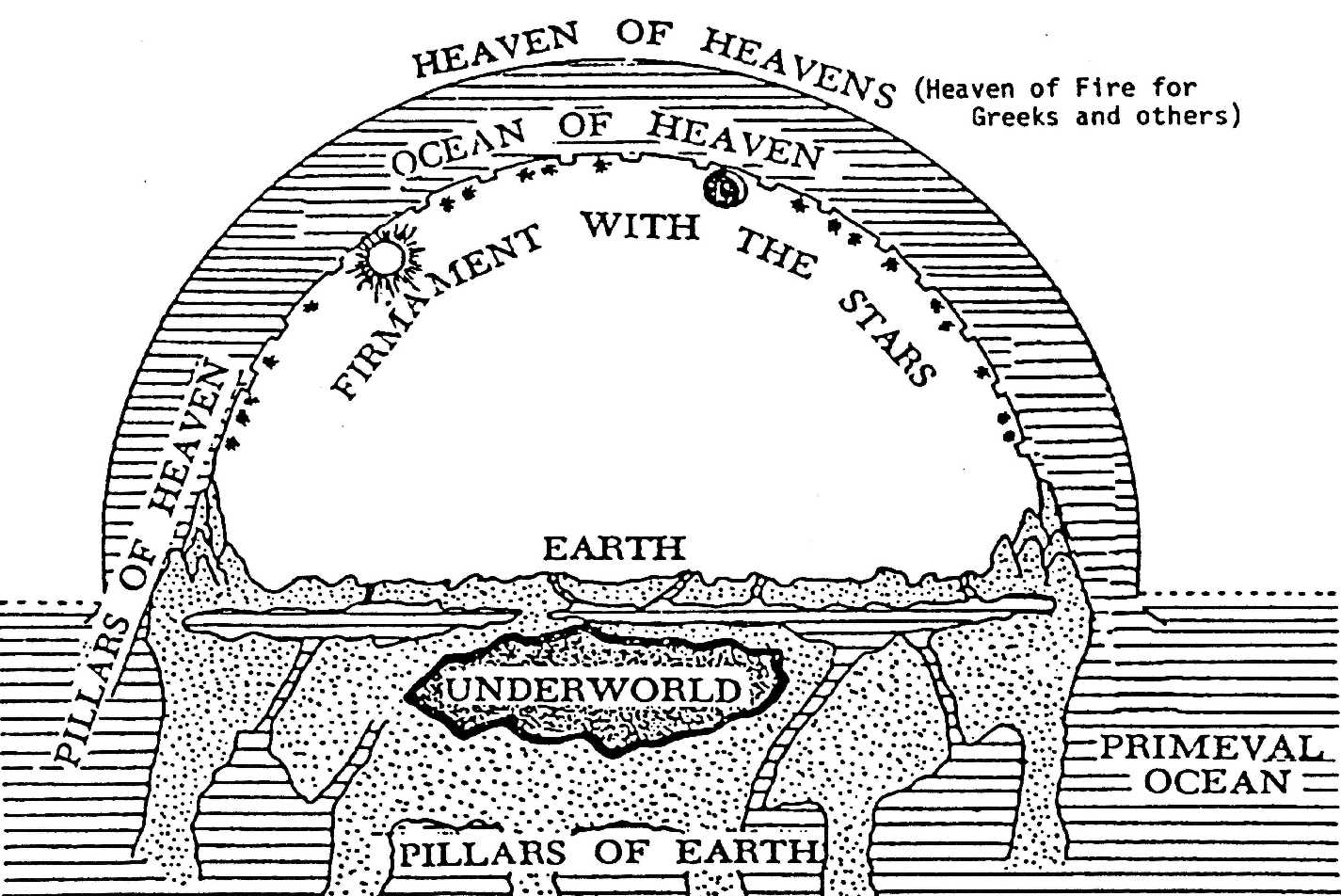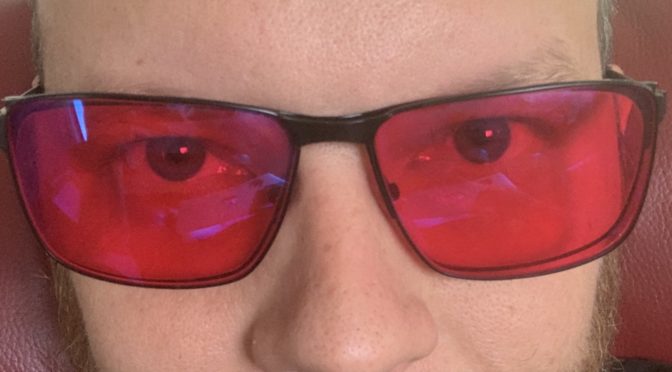My wife Robyn is an amazing gift giver. She is thoughtful. This year for Father’s Day she exceeded all expectations by giving me a trip to the optometrist and some new glasses.
That might sound like an anti-climax.
New glasses.
But these are magic glasses.

I can now see colours that previously did not exist for me.
Colour blindness is a weird phenomenon to try to explain to someone who doesn’t experience it. I’ve given up. I’ve also given up playing the game where people ask ‘what colour is this’ because I just don’t know, and I can’t see what I’m missing, and I hate that. I hate trying to identify colours, especially around the red/green spectrums, but the way colour works means I also have trouble with purples, and yellows, and other weird colours I’d never expected.
I had a default way of seeing the world. I had no idea what I was missing.
But now I know.
And boy, was I missing a lot.
You can watch reaction videos that pretty much capture my experience here.
It’s crazy to know how much I was missing. One way to demonstrate it, simply, is that I thought I had these apps on my phone’s home screen grouped by colour.
![]()
Now I know I didn’t…
One retailer of these glasses, EnChroma, has a video that says that colour blind people see “a world less saturated, less vibrant” and that has been my experience. Apparently you non-colour blind people can experience life through our eyes by looking at the world through a piece of green cellophane.
Even wearing them I spent a bunch of time skeptical that what I’m seeing now is really real, and not just the world through rose coloured glasses (and maybe the person who coined that idiom was colour blind…). But the more I dig in to this reality, the realer it seems. EnChroma has an online colour blindness test. Here are my results without the glasses on, and then wearing them.


I was missing so much. Who knew? Well. Everybody. Everybody who isn’t colour blind that is. And if you are colour blind — those reaction videos are real. These glasses are amazing.
It’s worth seeing the world as it is.
Over the past year or two I’ve been having another experience that feels a lot like this. I think I’m also recovering from being spiritually colour blind.
It started with my deep dive into C.S Lewis’ academic work The Discarded Image, and Charles Taylor’s A Secular Age, and their shared analysis of the modern western world; that we’ve chosen a view of the world that is “less saturated” and “less vibrant”; that we’ve, because of our commitment to rationalism and a purely ‘sensible’ world; a world where only what we can sense is real; disenchanted reality. Where we could’ve kept our rose coloured glasses on we’ve reached for (or been given) the green cellophane by a culture, and powerful institutions, and perhaps spiritual forces, that do very well for themselves by keeping us blind to reality as it is. We settle for a less saturated, less vibrant, life and colour blindness becomes our reality, green cellophane becomes our lens.
And this lens effects the way we see everything. Reality as we live in it, but also, for Christians, the Bible and the story of Jesus as we encounter it. One ‘new pair of glasses’ that might help us see the world as it really is, or at least one that worked for me, was Michael Heiser’s Unseen Realm, which invites us to free ourselves of the green cellophane view provided by the modern world, and to read the Biblical text the way its first readers would have understood it; part of this exercise is to, with Lewis, Taylor, and Heiser, acknowledge that not every part of our modern, secular, age is a product of a Christian vision of reality, and that not everything modern is truer than the past.
Trying to take off the ‘green cellophane’ of the disenchanted view, or overcoming spiritual colour blindness with this new lens is weird. I spend a lot of time feeling the same sort of skepticism about this way of seeing the world that I now feel when I see colours. Surely this can’t actually be real?
There’s an interesting dynamic here for me where, for example, there’s a temptation to read Genesis 1 as modern people and either say ‘science disproved this, so it can’t be true’ or to read the creation story through the lens of modern science and try to make it cohere, and this is a trap that both the young earth creationist movement and old earth counterparts fall into.

I remember sitting in an Old Testament subject at college scoffing at ancient conceptual maps of the cosmos with a heavenly and earthly realm like this one, because to take that seriously was to take the Old Testament too literally, when we now have our model of the universe through science, and so our job was to get to the ‘actual truth’ the Old Testament was trying to convey; that God is the creator of a good and ordered world, and we mess it up through sin… but what if one of the big points of the creation story is that there is a heavenly realm, and an earthly one? And what if this is one of the threads that binds the whole narrative of the Bible from first chapter to last chapter together (where heaven and earth are brought together in a new creation)?
The green cellophane view says ‘get to the sensible point that aligns with how we see reality’ — but the rose coloured glasses say ‘sit with the view of the cosmos this text creates and have it change the way you see reality.’
This doesn’t mean rejecting the insights of science around material questions, or even questions about the age of the earth, but it means the activity of trying to approach the text of Genesis 1 through green cellophane is always going to leave you with a less vibrant, less saturated, world.
This is also true of the Gospel itself; if we green cellophane the Gospel stories then reading these biographies of Jesus leaves us looking for the “Jesus of history” and positioning Jesus as an alternative, revolutionary, political leader to Caesar, bringing an alternative economic system that we’d love to see realised in this world as we pursue justice; a moral example; a wise teacher; and maybe at most, still a saviour who’ll bring forgiveness to you in a divine economy or supernatural order that has very little to do with day to day life now (and very little to say about the significance of the Holy Spirit). The stuff about Satan and Demons you shove to the side. Angels become ‘human messengers’ through a little etymological gymnastics (literally what we were taught at Bible college by a former lecturer though), and you’re left with a disenchanted Christianity. The rose coloured glasses view — the more vibrant, more saturated view — sees the Gospels as the story of God’s victory over Satan and his demons; those authorities and powers that ruled the nations, and captured and captivated Israel, exiling them from God, and a victory that means beastly human governments that are built around spiritual powers and authorities no longer have dominion over people. It’s a victory that means not only can Israel come home to God via their Messiah, but the nations can be restored as well, and be seated in the heavenly realms, even now, because of our union with Jesus by the presence of the Spirit.
We’ve been working through Ephesians at church this year, and I think seeing reality this way is exactly what Paul is after when he prays for the church that the “eyes of your heart may be enlightened” (Ephesians 1:17) before launching into the story of how Jews and Gentiles are now united in Jesus, raised together with him, and seated in the heavenlies. He wants this reality to be their view of the day to day world we live in; a more vibrant, more saturated, reality.
Here’s one of the talks I gave in that series where one older, wiser, listener (ok, my dad, who’s got a pretty compelling picture of the way pronouns in Ephesians are used to distinguish Jewish Christians (we and us) from Gentile Christians (you) in Paul’s schema) summed up with the statement ‘who knew the Nephilim were so important for understanding the Bible’… You might think getting to those strange ‘sons of God’ in Genesis is a ‘weird flex’ from Ephesians… and you might be right. Consider this an invitation to put on some rose coloured glasses and take up a more vibrant, more saturated, view of the world, including how we understand politics, economics, and ethics (how we live as people, in communities). It’s straight off our Zoom recording, filmed from an iPhone, so apologies for the quality.
Maybe we need a way of seeing the world that is different to the green cellophane handed to us; a more vibrant, more vivid world. Maybe those ideas of ‘the eyes of our hearts being opened’ and us being enlightened is part of recapturing the wonder not just of the Gospel, but of creation itself.
Perhaps our job as people ‘raised with Christ and seated in the heavenlies’ is to first see the reality of God and his world rightly, through new lenses, and then to see our task as getting the good news and the rose coloured glasses out to as many people as possible; what if we were as excited about the eye opening truth of the Gospel as the people in those reaction videos putting on their rose coloured glasses for the first time?
The trick is that so much of this task actually starts within the church, where, we’ve been so thoroughly schooled from the rational, sensible, secular age outlook that to simply say what the Bible says about the Spiritual realm and its reality, and its interplay with the political or the economic makes you feel and sound like a crazy person. Why settle for a less vivid, less saturated world when you can see truly.
